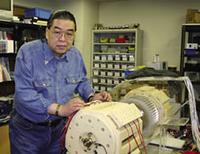| Kohei Minato's Magical Motor | 2004-04-04 12:07 28 comments |
 by Flemming Funch by Flemming FunchFrom japan.com, a story about inventor Kohei Minato and his Japan Magnetic Fan Company. He has apparently come up with a magnetic motor that consumes stunningly little electricity. OK, let's cut to the chase: it uses so little electricity that you can connect up a generator to it and get out more electricity than you put in. I.e. it is an over-unity device. What typically happens with over-unity devices is either that the inventor is found to be a con artist, who had hidden wires built into the table or something, and who just wanted to scam investors out of money. Or the patent gets bought up by General Motors, and nobody ever hears about it again. Or the inventor suddenly meets his untimely death in a freak boating accident. The general consensus among people who're interested in that kind of thing, and actually serious about it, is that the only ways of ever getting an invention like that to market would either be to release workable blueprints all over the Internet, or it would be to camouflage it as an ordinary product that simply is unusually efficient. Minato is following he latter approach. Apparently he has sold 40,000 units to be used to drive cooling fans in convenience stores in Japan. So, just energy-efficient motors. Nobody can have a problem with that, right? And if he gets away with that, he can do something a little more bold with it next. You can find some technical comments on how Minato's device might work from Tom Bearden, one of the gurus of over-unity theory, here, down in the middle of the page. But, warning, this is all impossible according to your highschool physics. If this kind of thing works, the energy will be coming from tapping ubiquitous fields that mainstream science simply doesn't believe in. |